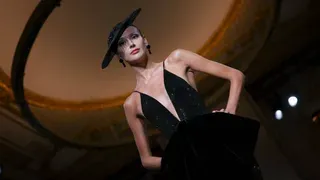June 18, 2015
Alto
Jake Mulligan READ TIME: 2 MIN.
Here's a curious recipe: "Alto" features as many characters as a Robert Altman movie, and as many nods to the mob as "Goodfellas." The directorial debut of Mikki del Monico is a movie about Italian culture -- more specifically, it's about "Godfather" culture. Everyone here is wrapped up in a stereotype, either by indulging it or by repelling it: Some characters are in the mob, some despise the cultural connotations it brings with it, and some work for the feds, and are determined to bring it down. One way or another, love it or hate it, they're all caught in the conspiracy,
For the center of the film, there's not a character, but a television show. Everyone's grown obsessed with "Mob Hit," a fictional hit program that sounds like "The Sopranos" by way of "American Idol." Frankie hates the show, but then she walks into its real-world equivalent: She finds a corpse, left behind by a literal mob hit, in the trunk of her rental car. Curiosity gets the better of her, and she tracks down the man's funeral. There, she meets and is smitten by Nicolette, the daughter of the new local mob boss. Frankie's predilections should have her repelling the advances Nicolette puts forward -- and she's also engaged to be married to a man, complicating things much further -- but everyone around her is mesmerized by her new friend's lifestyle. Even her priest is looking to loop "Mob Hit" into his local sermons. "Jesus forgives mobsters, Frankie," her elder tells her, "and so should you."
That advice doesn't work out so well. The FBI is soon on the trail of Frankie and her family, seeing them as outsiders who can be used to gain some inside information. Not long after, Nicolette's father is made aware of their potential treachery, which turns everyone involved against each other; all while, the two leading ladies struggle to keep their flirtations alive. The machinations of the plot quickly grow convoluted, but the atmosphere is entirely organic: The borrowed phrases, the Brando-esque diction, the exaggerated gestures. "Alto" may not accurately reflect the mob -- it's closer to parody than to Scorsese -- but it's quite perceptive about the ways that people are obsessed with it.







